












The CEO of FBN Bank Ghana, Victor Yaw Asante, has revealed that most banks are anxious over the debt exchange programme in its current form, with likely implication of liquidity expected to a ect their operations.

Ghana, which is going through its worst economic crisis in a generation, in December last year launched a plan to exchange its local bonds for new ones with fresh maturity dates and coupon rates to help restore macroeconomic stability.
But some groups representing nancial institutions that hold Ghana's debt have raised concerns that the restructuring as presented by the nance ministry would not work.
Banks worried Speaking with journalists on the sidelines of the maiden McDan Business Forum in Accra, Mr. Asante said “there is liquidity problems, most banks are worried that if it is implemented the way it is said, we will not have liquidity so those are part of the engagements we have been having with the regulator and central bank about how we manage the liquidity because if you don’t have liquidity, we can’t support the private sector.
We have to see if we can get some forbearance around the requirements of a regular bank and these are the things, we are working on with them, else it will a ect the private sector.”
The Bank of Ghana has encouraged all banks to fully participate in the
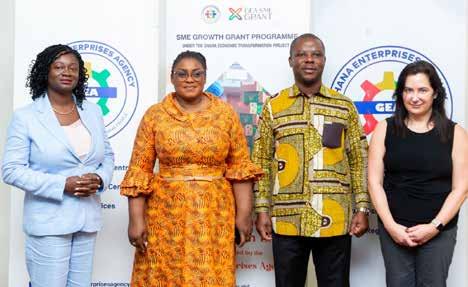
 By Eugene Davis
By Eugene Davis
Debt Exchange.
In its letter released last year, it revealed “The Bank of Ghana has conducted stress tests on banks based on their holdings of domes tic public debt and has estimated potential impacts that could result from participation in the Debt Exchange,” BoG noted in a state ment.
The relief measures in the central bank's letter include the reduction of cash reserve requirement ratio to 12% on cedi deposits, and the risk-weights for new bonds to be 0% for calculating the capital adequacy ratio and 100% for old bonds.
Other measures listed in the central bank letter to banks include reducing the Capital Conservation Bu er from 3% to 0%, which it said would "e ectively" cut the CAR from 13% to 10%.
It also said it expected banks to suspend dividend payments and other payouts to shareholders.

Banks can access a nancial stability fund, which has a target amount of $1.2 bn to be raised from the World Bank and other international nancial institutions, "as a last resort liquidity backstop".
Ghana is poised to request debt relief via the G20 Common Framework programme and has sought reassurances that the negotiations can be expedited before proceeding.
The country has already secured a $3 bn sta -level agreement with the
It must restructure its debt to get the nal approval to access the IMF funds. In December, Ghana launched a domestic debt exchange and later said it would default on nearly all of its $28.4 billion of external debts.
Government is reported to have reached out to the Paris Club of creditor countries in December to ask for assurances that the Common Framework process, set up by the Group of 20 leading economies in 2020 in response to COVID-19, could be expedited.
The west African producer of gold, cocoa and oil is aiming to cut its debt-to-GDP ratio from 100% to 55% by 2027, as it struggles with interest payments that the nance minister said have jumped to between 70% and 100% of revenues.
Businesses with potential to export, expand their markets, grow at an accelerated rate that can create employment are eligible to apply for government’s newly introduced SME High Growth Programme under the Ghana Economic Transformation Project (GETP), CEO of Ghana Enterprises Agency (GEA), Kosi Yankey-Ayeh has said.
The SME High Growth Programme is a Challenge Fund, funded by the World Bank and managed by the Grant Programme in Accra on
Grant Programme in Accra on Wednesday, she said “We want to make the emphasis on technical assistance because more and more, we realise that people want the funding -but we don’t want it to be only focused on the funding because it does not solve the problem.
To be able to transform and accelerate growth, we need technical assistance, we are looking at people who are really committed to want to go through the technical assistance programme to be able to transform and we take it to the next level.”
The SME High Growth Programme will target high growth SMEs across ICT,Agribusiness/Agro-processing, Education,Manufacturing,Food and Beverage,Textile and Garment, Construction, Tourism and Hospitality, Trade/Commerce of locally produced goods, Transport and Logistics,Healthcare or Pharmaceutical industries in Ghana.
Enterprises shall be de ned and di erentiated by these three key variables; employee size, annual sales/turnover amount, historical productivity, nancial growth and exports.
A business Tax Identi cation Number (TIN),Business Registration Certi cate or Certi cate of Incorporation, all shareholders and directors of the business must have and supply their Ghana Card Number, in lieu of which their Personal TIN must be supplied, nancial statements or income statement for the years 2019 to 2022.
All business owners must have valid identity documents issued by a Ghanaian government authority such as passport or the Ghana card.
SMEs with majority Ghanaian shareholding (51percent or more)
are eligible to apply to the SME High Growth Programme. Applying SMEs must be registered under Ghanaian law as a limited liability company, a partnership or sole trader and must be majority owned by a Ghanaian
The new SME High Growth Programme is designed to build on and consolidate the successes so far. It designed to provide training and capacity building necessary to lead to operational e ciency of the enterprises, boost their competitiveness and scale up their operations for further job creation.
Over GHS 65 million has been disbursed/committed to 800+ SMEs between September 2021 to December 2022.
Through this partnership a grant support of GHs160m equivalent of US$20m has been earmarked for the agship SME High Growth Programme targeting SMEs nationwide, for general training, capacity upgrades, consulting, and nancing for selected and quali ed SMEs.
The Grant Programme’s support is expected help at 2000 SMEs to become investment ready (capable attracting both local and foreign capital into their business), increase sales and more importantly build their capacities to export and culminate into job creation and job sustainability.
The criteria for selection include, the entrepreneur must have majority Ghanaian shareholding (51% or more) in the business, must be regis-
tered under Ghanaian law as a limited liability company, a partnership, or sole trader.
Applicants are encouraged to read the detailed eligibility criteria to determine eligibility before applying, Small enterprises should demonstrate an employee size of 6 –30 and/or annual sales between GHS 180,000 – GHS 7.2m, Medium enterprises should demonstrate an employee size of 31 – 100 and annual sales between GHS 7.2M – GHS 21.6M.
A Deputy Trade and Industry Minister, Nana Ama Dokua Asiamah-Adjei who launched the programme, reiterated government’s commitment to fully implement all initiatives under the Ghana Economic Transformation Project, including the Grant Programme, for the full bene t of SMEs across the country.
“From the policy point of view, the Ministry of Trade and Industry will do the needful just as GEA will undertake the direct implementation of the GET Project in line with Government’s priority to support achieve economic transformation.
I like to admonish and encourage all bene ciaries to use every Cedi of grant received for the intended purposes. That way, I rmly believe without any doubts that SMEs will be able to grow and expand their operations with full gains. Whiles, Ghana at large and the citizenry bene ts most through jobs and wealth created, foreign exchange earned from value-added exports and much more.”

With in ation and rising utility prices putting pressure on both disposable consumer income and business margins, Glovo— a pioneering multi-category app —has today launched Glovo Local, a new program for small and medium-sized businesses in the retail and restaurant industries to enable them to digitise their products and services in order to boost their growth.
Launching in all 25 markets in which Glovo operates, Glovo Local is the rst such program in Europe, Africa, and Asia that provides a consolidated portfolio of services and solutions for small & medium-sized businesses, speci c to their needs.
Services available to them include digital and operational solutions for their own channels and stores; dedicated tools to help them manage their operations at point of sale (from data insights to providing supply chain solutions), and grow their businesses with marketing and advertising capabilities to help
them reach new customers and increase their visibility. All of this is embedded in an ecosystem of learning and development opportunities with dedicated tutorials and support within their digital journey.
Glovo Local is an all-in-one hub where local businesses can pick and choose solutions based on their needs and wants through a single site.
Rodrigo Alier, Executive Director, Partners & Brands at Glovo, said: “Only 20% of merchants globally conduct their business online—highlighting the urgent need for more to nd routes to digitisation. More than 100,000 of the businesses we work with globally are small local businesses, and the cost-of-living crisis is weighing heavily on them.
Glovo aims to have more than 250,000 small local businesses online by the end of 2023. We acknowledge the role we play in helping those businesses thrive, and with Glovo Local we put them front and centre of our strategy, doubling down on our tech and operational e orts to bring them more and better solutions to
to boost their businesses. Using the tools Glovo Local provides, we can help them reach more customers, accelerating their way to growth and sustainable pro tability. This is how we pave the way for businesses to grow and boost local economies. “From research we’ve recently conducted in nine countries, it’s clear that businesses are collectively expecting a tough time ahead. Every second business sees itself unprepared for the future. In the UK alone, that number goes up to 80%, with two-thirds already in survival mode. Glovo Local and all its brandnew technological capabil-
ities have been developed with one goal in mind – to help these businesses not only see a way through current economic turmoil, but to go from surviving to thriving.”
The launch of Glovo Local coincides with research commissioned by Glovo in nine markets. It found that 80% of small and medium-sized UK businesses in the retail and restaurant industries are worried about their future pro tability, and 32% were facing the challenge of reduced consumer spending. The research also shows that almost half
of businesses in Spain (46%) are nding it di cult to keep up with the pace of change and 57% in Romania say consumers are more focused on digital experiences than in-store.
Many restaurants, retailers, and grocery businesses surveyed across Europe and Africa said that they scaled up their marketing and advertising e orts to combat lower consumer demand, but often lack the resources they need to carry out broad marketing activities. Glovo Local opens up vital routes for businesses into growth, innovation and continued customer experi-
ence.
About Glovo Glovo is a pioneering multi-category app connecting users with businesses, and couriers, o ering on-demand services from local restaurants, grocers and supermarkets, pharmacies and high street retail stores. Glovo’s vision is to give everyone easy access to everything within their city, so that our users can enjoy what they want, when they want, where they want. Founded in 2015 in Barcelona, it operates across 25 countries in Southern Europe and EEMEA.
FBNBank has held a health walk as part of its activities to usher in the new year. The event also indicated FBNBank’s readiness to o er the best service to its customers and to deliver a great year with a focused team walking, as it were, towards a common goal.
FBNBank has over the past years, at the beginning of each year, engaged in a health walk with active participation across all sta groups. This year’s walk started from the Bank’s new East Legon branch and ended at the head o ce on the Liberation Road, covering a distance of about six kilometers traversed in about two hours by around 150 participants.
Speaking at the end of the walk, Managing Director/CEO of FBNBank Ghana, Victor Yaw Asante said “the Bank embarked on the walk to welcome the new year and also to promote good health among the sta of the Bank.”
Mr. Victor Yaw Asante reiterated that, “FBNBank will continue to
remain focused on delivering on our promise of putting our stakeholders, especially our clients and customers at the heart of what we do. We will maintain our focus on the youth. We will continue o ering the propositions which will help support the youth of this country to become the leaders of tomorrow. We will also refresh our digital o erings ensuring that we stay ahead of the game. FBNBank has always maintained that we have to o er our customers and clients convenience and security through a variety of channels, products and services so as we improve our footprints, we will also improve on our digital o erings.” He added that that the Bank’s 2022 performance and achievements were worth building on and he went on to enumerate the awards the Bank received. “Last year, 2022, we had a number of highs for us as a brand and business. It is great testament to our resilience and also to our passion for what we do,” he stated.
In 2022, FBNBank was awarded the “Best Commercial Banking Brand” and “Best Small and Medium-scale
Global Brands Awards. The Bank also received the award for “Best Bank in Supporting Government Institutions at the 2022 Sustainability and Social Investment Awards as well as the Best Bank in SME Banking at the Connected Banking Summit (West Africa) Innovation and Excellence Awards and joined the coveted league of Ghana’s top hundred companies, Ghana Club 100. In addition to all these FBNBank added new branches at East Legon, Abossey Okai and Atomic Junction as well as a Collections Centre at the Ghana Ports & Harbours Authority Long Room in Community 1, Tema to their branch network.
Mr. Asante continued by commending all sta for their hard work which had placed the Bank in an enviable position and entreated them not to rest on their oars but to work harder to sustain the nancial performance in order to help the Bank achieve the targets set for 2023.
He concluded by saying “FBNBank will remain focused on delivering on
its promise of putting customers and clients at the heart of its operations. We will continue to build a strong partnership by providing outstanding products, services and support at every stage in our client's life journey.” He thanked all the sta and their friends and relations and also the media for making time to join the walk, in order to keep their bodies, t.
FBNBank has in its 27 years of operating in Ghana remained focused on putting its customers and communities rst. This, it has sought to do through the rich value and excellence of what the Bank contributes to the relationship with its stakeholders as a whole, particularly the customers. FBNBank Ghana is a member of the First Bank of Nigeria Limited Group which is renowned for its great customer service and general stakeholder engagement garnered in its 128 years of operation. FBNBank Ghana has 23 branches and 3 agencies across the country with over 500 sta . FBNBank o ers universal banking services to individuals and businesses in Ghana.
UBA Ghana Ranks No. 1 in Customer Experience by KPMG UBA sets Customer Experience benchmark in Ghana United Bank for Africa (UBA) Ghana has been ranked number 1 in Customer Experience in the third edition of the KPMG Ghana Banking Industry Customer Experience (BICX) Survey.
The survey which aims to understand customers' banking experiences and their expectations from banks was conducted in 2022 surveying all 23 Banks in the Country. It covered Retail, SME and Corporate Banking customers. The survey used the six pillars of Customer Experience namely: Integrity, Empathy, Resolution, Personalization, Time and E ort as well as Expectations.
You will recall that last year, the international nancial magazine, Global Finance named United Bank
tremendous pride to have been the only bank to score above 80% in the Retail customer experience survey”.
He expressed his immense gratitude to the entire team at UBA Ghana for living up to their mandate of putting the Customers rst.
This number 1 ranking is a clear indication of the hard work and dedication of our customer service representatives across our o ces, who consistently go the extra mile and beyond to provide outstanding customer service.
He added that UBA Ghana will not relent but will strengthen its commitment to improving and delivering the highest level of customer experience and satisfaction that would meet the customers’ expectations and banking needs.
According to the report released in January 2023, UBA topped the list of banks in Ghana with the highest score of 81.40 percent.
--END--
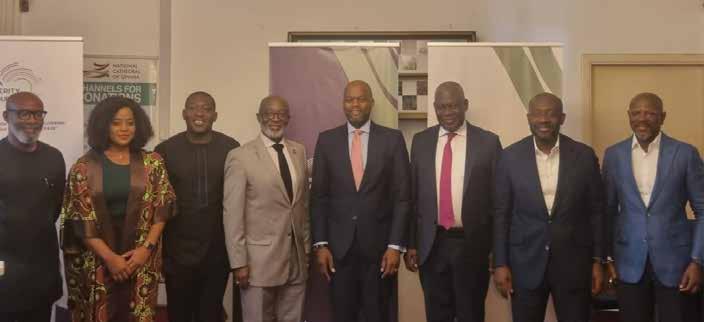
all Africans,” he added.
According to Dr. Eugene Owusu, among other things, the organizers anticipate that the summit will help in the “sharing of best practices and, importantly, practical actions to expedite the movement of people, goods and services across the continent as envisaged under the AfCFTA.
It will as well foster stronger strategic partnerships between industry leaders and Heads of State on speci c transformational projects that will accelerate implementation of the AfCFTA”.
African Business Leaders have been encouraged to use the maiden edition of the Africa Prosperity Dialogue Series, known as the Kwahu Summit, to turn around the fortunes of Africa’s intra-African investment and trade.
Speaking at the pre-summit press conference in Accra, the Minister of Information, Kojo Oppong Nkrumah, noted that the two big needs of Africa are to increase the intra-African business story and intra-African trade story. He said the summit provides an opportunity for African leaders and African industry to meet and netune the kind of ideas that will open the gate to the next frontiers in Africa.
“The importance of this platform and the dialogues that will come out of it cannot be overstated. A platform like this gives us a real opportunity, not a political summit, not any other summit, but
industry practitioners and policymakers that will open the next frontiers of Africa,” he said.
According to him, it is expected that the coalition of actors from the continent will take advantage of likeminded persons and the kind of conversations that will take place to move the intra-African investment agenda and the intra-African trade agenda.
In his remarks, the Executive Director and Coordinator of the Summit, Dr. Eugene Owusu, noted that the African Continental Free Trade Area (AfCFTA) had set the stage for Africa’s industrialisation drive He believes the initiative holds the key to the prosperity of the continent. He therefore underscored the need to leverage the AfCFTA to unleash the full potential of the continent, and to change the narrative about
In his view, the key areas that are critical to unleash the potential of the AfCFTA include the following: enhancing productive capacity such as transportation, agriculture and energy; nance, technology and innovation (including, especially, Payment Systems); critical legal and institutional constraints to the actualization of the single African market and free movement of people across borders.
“It is our hope that the maiden Kwahu Summit will help de ne concrete strategic actions by political and business leaders across the continent, including the right mix of policies,” he noted.
“We also do hope that the Summit will foster a greater sense of purpose for more robust intra-Africa trade to happen to support the much-needed industrialization of the continent, which is so key for the prosperity of
The Kwahu Summit will be held from January 26 to 28 January 2023 in the Eastern Region, with personalities from South Africa, Nigeria, Ethiopia, Morocco, Kenya, Cote D’Ivoire and Cameroon.
The theme for the conference, dubbed ‘Kwahu Summit’, is “AfCFTA: From Ambition to Action – Delivering Prosperity through Continental Trade”.
The Dialogue will be in two parts: Business and Policy Leaders Dialogue that will take place at the Safari Valley Resort at Adukrom in the Akwapim Hills and Presidential and Business Leaders Summit that will be held at the Peduase Presidential Lodge.
The Business and Policy Leaders’ Dialogue will bring together business executives, trade associations, ministers of state, heads of Regional Economic Communities under the AU, technocrats, women, young entrepreneurs and Thought Leaders to de ne practical ‘quick wins’ to move the AfCFTA initiative from Ambition to Action.
With the ease of COVID-19 containment measures, and given the resilience and potential of its economy, analysts believe China's economy will revive next year and continue to be a reliable and important driving force of the global economy in 2023.
"Despite global macroeconomic headwinds and the impact of the pandemic, China's economic performance in 2022 was very commendable," Lawrence Loh, Director of Center for Governance and Sustainability at the National University of Singapore Business School told China Media Group (CMG).
The good expectation is further forti ed by the annual Central Economic Work Conference in Beijing ended on Friday with principles for next year's economic development set and priorities for next year's economic work arranged, including expanding domestic demand, accelerating the construction of the modern industrial system, consolidating public sector and supporting private business, attracting more foreign investment, as well as preventing major economic and nancial risks.
"The meeting has pointed out the direction for economic development next year and beyond. At the same time, it addressed very specific issues, such as expanding domestic demand and attaching importance to technological innovation. It's like Chinese acupuncture, nding the right point and applying the right force to achieve the desired e ect," Loh said.
Observers predict a good performance of China's economy
With medical systems forti ed, new variants getting tamer and 90 percent of the population armed with vaccines, China recently announced new measures to optimize its epidemic control measures.
Noting the recent measures to ease COVID-19 restrictions, Liang Guoyong, a senior economist with the UN Conference on Trade and Development, said that although the change will inevitably bring some pains in the short term, the adjustment is bene cial for the revitalization of economic activities and business con dence, pushing the economy
back on a healthy growth track. Looking forward to 2023, China's economy is expected to show a strong recovery, with growth momentum considerably strengthened, Liang said. "This will provide an important impetus for the growth of the world economy and contribute to its overall stability."
Recently, reports from several global banks predicted that the Chinese economy will have a good performance in 2023 with Morgan Stanley and Societe Generale, two multinational nancial services companies forecasting a ve percent overall growth in 2023. Their optimism is built on multiple positive signs and indicators.
International Monetary Fund Managing Director Kristalina Georgieva said that China has scal space to boost its economy and counter the downward pressure. Rhodium Group, a global research provider, said the largest rms have sunk billions of dollars into Chinese assets and are staying put in a report published on Tuesday. "Chinese equities have risen 37 percent since the start of November following multiple positive reopening signals from Beijing," read a research note by UBS strategists Christopher Swann and Vincent Heaney on Monday.
Meanwhile, a host of multinationals are expanding their operation and investment in China. In the rst 10 months, foreign direct investment in the Chinese mainland in actual use went up 17.4 percent year on year to 168.34 billion U.S. dollars, o cial data shows.
One of the heavyweight investors is German automaker Volkswagen. In the second half of this year alone, the company announced investments of up to 3 billion dollars in two new R&D-focused joint ventures in China.
China "will see more foreign investors, more business opportunities and more exchanges in economy, trade, technology and industry, ”Christian Sommer, Chairman of the German Center for Industry and Trade GmbH told CMG, "I'm condent that more and more Chinese companies and talents will come to invest and do business in Europe. I have full con dence in China's economy."
China's rebound will further boost world economic growth
As the world's second largest consumer market, second largest source of foreign investment and a major trading partner of over 130 countries and regions, China stays committed to promoting high-level opening up and accelerating e orts to foster a new development paradigm.
Through multilateral mechanisms such as the Belt and Road Initiative and the Regional Comprehensive Economic Partnership, China has become even more closely bonded with its global and regional partners, many of which are expecting a robust recovery of the Chinese economy, which will inject strong momentum into the world in the near future.
In this year's annual Central Economic Work Conference, the government reemphasized the importance of opening up to the outside world. The meeting said that China would expand market access, open up more service sectors and ensure foreign enterprises receive national treatment and equal participation in government procurement, bidding and standard-setting, as well as deepen domestic reforms, aligning Chinese enterprises with the high standards set by global organizations, such as Comprehensive Progressive Trans-Paci c Partnership (CPTPP) and Digital Economy Partnership Agreement (DEPA).
The meeting "is not only promoting China's economic development but also positive for partner countries,”Gustavo Cáceres, executive director of the Ecuadorian-Chinese Chamber of Commerce said, "Over the years of international trade, we've seen that China hopes to achieve common
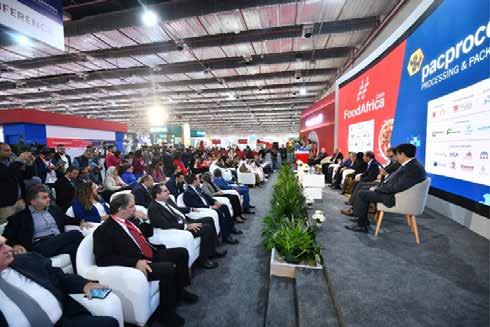
development through cooperation. Thanks to China's opening-up policy, more and more Chinese companies are doing business with us.”
In the rst 11 months, China's trade in goods expanded 8.6 percent year on year to 38.34 trillion yuan (5.5 trillion U.S. dollars), with the Association of Southeast Asian Nations being its largest trading partner, o cial data shows.
The growth "proves that China has opened up its market wider for the world and has actively participated in international trade even during the COVID-19 pandemic," Joseph Matthews, a senior professor at the BELTEI International University in Phnom Penh said.
"China is one of the most important economic partners, business partners for all countries and businesses," Jan Knoerich, a senior lecturer in the economy of China at King's College London, said. "What it does and how its economy is doing does have an impact on the global economy and in uences the global economy."
"With such a big economy of scale, China is playing its role and turning out to be a land of opportunities of the East," said Badiea Shaukat, an economic consultant at Sustainable Development Policy Institute, an Islamabad-based think tank.
China has e ectively coordinated COVID-19 prevention while maintaining its economic and social development, and will continue to be a stabilizing power in the region and the world, said Coskun Kucukozmen, a professor of trade and nance at Turkiye's Izmir University of Economics.
(With input from Xinhua)
Flagship trade fair consortium, Interpack Alliance, o ered tailor-made solutions for international markets at this year’s Food Africa and pacprocess MEA exhibition. The event attracted high international attendees, strong growth rates, and an avid interest by stakeholders in the food and packaging industries. It was held at the Egypt International Exhibition Center in Cairo from 5th of December to 7th, with over 25,800 visitors from over
60 countries in attendance.
Pacprocess has been a part of the Interpack Alliance since 2021 and is organized by Messe Düsseldorf in collaboration with its partners IFP Egypt and Konzept. For years, it has held the top spot in the African food packaging sector, and now further strengthens its position as the agro-allied and packaging event of rst choice in the region via its coalition with Food Africa.
Pacprocess MEA 2022 was headlined
by discussions around processing and packaging being the ideal complement to Food Africa for the food industry. It provided a good overview of local, regional, and international suppliers of packaging machinery and consumables. The event continues to expand its prominence throughout the continent, there were 738 exhibitors from 32 countries and 14 national participations this year, resulting in a 60percent rise in attendees and a 70percent increase in exhibitors compared to the previous year.
Commenting at the exhibition,
Thomas Dohse, Director of Interpack Portfolios Processing & Packaging, said: “The impressive development of the event, as well as the mood and conversations on-site, illustrates once again that Africa and the Middle East are attractive destinations for many companies. Those not joining the fray leave many opportunities untapped. The integration of Food Africa into our portfolio sends out a signal. With this move, we o er a unique platform for accessing Africa’s mega market for food.”
“We have been operating in the
Egyptian market since 2012," stated Panagiotis Konstantarakos, Head of Exports Europe, THRACE PLASTICS PACK Co. S.A., who also spoke at the exhibition. "Our rst trade fair participation since the Covid crisis was at pacprocess MEA. We met both new and existing clients, especially from Egypt. We hope that these leads will result in deals. It is always important to show a presence; we believe this trade fair holds plenty of potential. It has been good to link it with Food Africa and a strong food sector.”
The 2022 Pacprocess and Food
Africa exhibition gave a comprehensive overview of all agricultural and food industry sectors and subsectors, including fresh produce, dates, seafood, nished food, herbs, spices, as well as packaging and processing technologies. It proved to be the most successful Food in Africa and pacprocess MEA show, signaling huge growth potential. This trade fair duo set numerous positive impulses and sparked successful business transactions after an economically challenging year.
Absa bank is living up to its promise of bringing the possibilities of its customers to life. With over a century heritage in Ghana’s banking sector from its erstwhile Barclays brand, the bank continues to nd unique ways of entrenching its leadership in the banking and corporate sectors.
From today, new and existing customers do not need to go to the branch to open an account. With a click of a button on its website, customers can now open an account without any physical intervention, anywhere, anytime and on any device.
Customer needs are changing globally, fueled by fast-paced digital
services and products. Progressive banks are racing ahead to nd innovative and creative ways to meet these needs in a very competitive banking landscape.
In Ghana, the pandemic paved the way for dynamic ways of engaging customers. Suddenly going to the branch became a challenge for some customers; who preferred to stay in the comfort of their homes and conduct transactions.
The new service by Absa drastically simpli es the account opening process and provides a huge relief and convenience for, especially new customers of the bank. The platform will also enable SME customers to submit applications
online for processing in a seamless manner.
Absa’s Director of Retail Banking, Charles Addo said: “We are always listening and innovating to meet the needs of our new and existing customers. The pandemic taught banks a lot of things. The age of “branchless” banking is here and our digital account opening platform, highlights the extent we are willing to go to make their lives better and more comfortable. A new way of banking is here, and we are excited to be an enabler.”
New customers can now access the digital account opening web-portal to begin the process.
As part of e orts to make Ghana an exporter of rice, the Minister of Food and Agriculture, Dr. Owusu Afriyie Akoto, has appealed to investors in Thailand to come and invest in Ghana’s rice sector.
He said Ghana has huge potential for rice production which is evident in its favourable climatic conditions, availability of arable lands and an open society with a vibrant democracy.
Dr. Afriyie Akoto made the appeal when a delegation of investors from Thailand, led by the Executive Chairman of the Jospong Group of Companies (JGC), Dr. Joseph Siaw Agyepong, and the Honorary Consul of Ghana in Thailand, Dr. Sicha Singsomboon, paid a courtesy call on him at the ministry on Friday, December 30, 2022.
He said Ghana can boast of about 40,000 hectares of land readily available to support large scale rice production, hence encouraged the Thai investors to take advantage of it and invest in the sector.
In addition, he assured the delegation of the government of Ghana’s
support for investors in the rice industry.
“Our rice production is seasonal, and, therefore, we want action targeted at planting rice in April, May June, assuring that “we will make sure that land is made available to you,” he asserted.
He said it was his ministry’s target to make Ghana self-su cient in rice production, which has seen some signi cant gains. However, he added that more needed to be done to bridge the de cit.


On this score, Dr. Afriyie Akoto charged the Thai delegation to bring an action programme to his ministry for consideration.
He asserted that the intervention by the private sector in the rice indus try was very crucial, noting that it will help in the government’s vision of commercialising the commodity.
While commending Jospong Group of Companies for venturing into rice production, he maintained that he will continue to give Dr. Siaw Agyepong all the encouragement and support in his e orts to help
the government address the food security challenge in the country.
The delegation from Thailand also visited the Minister of Trade and Industry, Mr. Alan Kwadwo Kyerematen.
According to Mr. Kyerematen, the government was fully committed to ensuring the successful implementation of the Ghana-Thailand rice project.
“Government is fully on board in terms of providing the enabling environment and policy framework for this project,” he said.
He praised the Executive Chairman of the Jospong Group of Companies (JGC), Dr. Joseph Siaw Agyepong, for venturing into rice production.
He was very con dent that the project will be productive and inure to the mutual bene t of both Ghana and Thailand.
Trade statistics between Ghana and Thailand, he bemoaned, has not been encouraging, but stated that there was much that Ghana could learn from Thailand.
Early in 2022, the JGC commenced its integrated rice farming project. And in showing the seriousness JGC attached to the project, a team led by its Executive Chairman, Dr. Siaw Agyepong, visited Thailand to understudy the Thai rice sector in order to replicate their experiences and strategy in Ghana.
The object JGC was to partner with major rice industry players in Thailand to provide technical and equipment support for the entire rice value chain in Ghana with the aim of boosting rice production in Ghana.
I could imagine the tears dropping down the cheek and the pain felt by the loved ones of Je rey K. Skilling; a 52-year-old man, who served as the CEO of Enron corporation from February to August 2001, as he was sentenced to 24 years in prison. Enron, an energy-trading company based in Houston, Texas had risen as high as number 7 in fortune magazine's list of top 500 US companies. In 2000, the company had employed 21,000 people and posted revenue of $111 billion.
However, the next year, Enron’s stock price began ebbing. In fact, according to report on This Day in History (www.history.com/.amp/this-day-in-history/enron- les-for-bankruptcy), it dropped from $90.75 in August 2000 to $0.26 by closing on November 30, 2001.
On December 2, 2001, after Dynegy, another energy company backed out of a planned $8.4 billion buy-out in late November, Enron
led for bankruptcy.
By the end of the year, Enron’s collapse had cost investors billions of dollars, wiped out some 5,600 jobs and liquidated almost $2.1 billion in pension plans. The question is what could have led to the collapse of a corporation whose asset is valued at $60 billion?
In 2000, Stewart Parnell became the President and CEO of Peanut Corporation of America (PCA); a company founded in 1967 by his father Hugh Parnell. PCA was a company that provided peanut and peanut butter products primarily to the "institutional food" market (schools, prisons and nursing homes), to food manufacturers for use in cookies, snacks, ice cream, and dog treats, and to other low-end markets.
By 2007, the company had grown to 90 employees and was doing $25 million in annual sales. It was estimated to be manufacturing roughly 2.5% of processed peanuts in the U.S. at that time.
However, in late 2008 and early 2009, as a result of Salmonella contamination event, 9 people died and at least 714 people (half of them children) fell ill, all from food poisoning after eating products containing contaminated peanuts (https://en.m.wikipedia.org/wiki/Peanut_Corporation_of_America).
This contamination triggered the most extensive food recall in U.S. history up to that time, involving 46
states, more than 360 companies, and more than 3,900 di erent products manufactured using PCA ingredients.
On February 13, 2009, Peanut Corporation of America ceased all manufacturing and business operations, and led for bankruptcy liquidation. From February 2009 investigation continued and by September 2015, Stewart Parnell was sentenced to 28 years in prison.
When business leaders ignore the rules or laws that should guide their conduct in the business environment, the world experiences havoc, pain, death and even the collapse of such organizations that it trusted to provide it with products that will be of help to its inhabitants? In the case of PCA, investigation revealed that their processing was being done without the knowledge and oversight of Food and Drug Administration (FDA), and other food handling and processing areas had gone long periods without federal inspection. In fact, one of the evidence against Stewart showed that he participated in a scheme to fabricate certi cates of analysis (COAs) accompanying various shipments of peanut products (https://www.justice.gov/opa/pr/former-o cials-and-broker-peanut-corporation-america-ind ictedrelated-salmonella-tainted). COAs are documents that summarize laboratory results, including results concerning the presence or absence of pathogens. On several occasions he participated in this
scheme to fabricate COAs stating that shipments of peanut products were free of pathogens when, in fact, there had been no tests on the products at all or when the laboratory results showed that a sample tested positive for salmonella.
“Enron” became synonymous with large-scale corporate fraud and corruption. The investigation by the Securities and Exchange Commission and the U.S. Justice Department revealed that Enron had in ated its earnings by hiding debts and losses in subsidiary partnerships. Lay Kenneth, the founder and chairman of Enron and Je rey K. Skilling, conspired to cover up their company’s nancial weaknesses from investors.
The investigation also brought down accounting giant Arthur Andersen, whose auditors were found guilty of deliberately destroying documents incriminating to Enron. You see, when leaders lose touch with people who are a ected by their decisionsthe customers, employees etc - and are hyper focused on the numbers, they are bound to make unethical decisions that, when the repercussions show, could be irreparable.
Godswill O. Erondu is the pioneer, Africa Workplace Leadership Summit. He is a leadership expert and works with organizationsprivate and public - to transform their leadership and culture in order to achieve superior performance and increased pro tability.
The President of the Ghanaian-Diaspora Nurses Alliance (G-DNA), Prof. Yvonne Commodore Mensah has called for the training of specialized nurses in order to boost healthcare needs of the citizens and also advance the profession in the country.

Available data shows the nurse-patient ratio currently in Ghana is 1:18, which means that at any point in time, one nurse is attending to
This statistic presents the need for the training of more nurses especially in diverse elds, it is to this end that the Ghanaian-Diaspora Nurses Alliance(G-DNA), a non-pro t organization looking to advance the course of nursing in the country has been launched.
Speaking to journalists at the launch of G-DNA at the University of Ghana, Legon in Accra last Friday, Prof. Commodore Mensah said “we hope to connect all Ghanaian nurses wherever they are -nurses who have Ghana in their DNA to come back home to advance nursing and healthcare in Ghana.
orandum
(MoU)
begins work on The
Ghana
Focal points will include the newly introduced e-levy, nancial sector recovery levy, energy sector levy and Covid-19 recovery levy, alongside other key developments, such as the implementation of tax identication numbers.
Commenting after the signing, Ibe said that OBG’s forthcoming report would be a valuable research tool for investors eyeing Ghana’s potential, coming against a changing business landscape marked by ambitious scal and tax
country moving to introduce policies and reforms aimed at ensuring new growth is sustainable and more inclusive.
In Ghana we have made a lot of progress in training more nurses but the progress that we have made in training basic nurses has not translated in progress in training specialty nurses, so we need nurses who are trained in diverse specialty areas such as cardiology, diabetes, infectious diseases, cancer and we need this specialized training to meet the healthcare needs of Ghanaians, so we know that a lot of chronic conditions are now more common such as hypertension, kidney disease, diabetes so we need to make sure that the nurses that we have in Ghana have the adequate level of specialization and training to be able to care for these patients.”
The Report: Ghana 2023 mark the culmination of than a year of eld research team of analysts from Oxford Business Group. It will be a guide to the many facets of country, including its macroeco nomics, infrastructure, banking and other sectoral develop ments. OBG’s publication also contain contributions leading representatives across the public and private sectors.
Further she indicated that the initiative has some prospects for nursing in the country, she said “At this
“Ghana is taking steps to restore macroeconomic stability and boost GDP in the recovery phase, which is key to instilling investor con dence and increasing in ows,” Tarta said. “PwC Ghana has long been instrumental in supporting a wide range of businesses looking to establish themselves and expand their presence in the country, combining in-depth knowledge of changes to the local tax and scal environment with the bene ts of a global professional resource base. I’m thrilled that our analysists and, in turn, the international investment community will continue to benet from their expertise in analysing this important market.”
The Report: Ghana 2023 will available online and in print. will form part of a series tailored studies that OBG currently producing with partners, alongside other highly relevant, go-to research including ESG and Future Readi ness reports, country-speci
stage we are at the process of listening and learning and understanding the unique challenges nurses in Ghana face and that is why we have breakout groups as part of the launch today -to hear from the nurses and we will take this information and analyse some of the feedback we have received to use this information to design programmes, webinars, conferences, seminars and some of those things will be o ered in person, virtual so if there are nurses in the diaspora who have training in di erent areas they can still contribute to this mission and help to teach their fellow Ghanaian nurses in these di erent areas as well.”
The Director General of Ghana Health Service, Dr. Patrick Kuma Aboagye conceded that there was the need to beef up the number of professional nurses in the country.
“Nurses leaving the country to Europe and other parts of the world, they are taking mainly the professional nurses and so there is the need for us to beef up the number of professional nurses, so what we are doing is rst to ensure that we expand the study leave for the auxiliary nurses so that in the next two to three years they can become professional nurses and also beef up the quality of nursing and healthcare in the country.
We have also established a system where we are looking around to do an assessment to see the real impact -what has been the real numbers that have left, we are also ensuring that for those who have gone to study and have certi cates and are professional nurses, we assess and upgrade them, so we can balance of the proportion of auxiliary – professional nurses; because we need more professional nurses to ensure that services are done well.”
Prof. Lydia Aziato, Vice Chancellor of the University of Health and Allied Sciences who was the keynote speaker at the event stated that there are limited opportunities for specialized training, funding for education and
other capacity-building opportunities for nurses and midwives in Ghana, which compound their service delivery.
“Although we have made signi cant strides in increasing the number of schools of nursing and midwifery both in public and private institutions in the last decade, more work is still needed especially in the area of specialization.”
The G-DNA is global intervention to advance healthcare delivery by encouraging Ghanaian nurses abroad to contribute to advance nursing and midwifery education and practice in Ghana.

Senator Sheldon Whitehouse (D-RI) and Representative Ro Khanna (D-CA) have called for an energy windfall tax. In a written statement, Khanna said, “Senator Whitehouse and I have been calling for a windfall pro t tax on Big Oil for months, and I’m thrilled to see President Biden publicly consider this approach.” Senator Elizabeth Warren has long supported this. In an earlier tweet, Warren said, “Big Oil’s rst priority is to maximize pro ts. We can’t let them use Putin’s invasion as an excuse to pad their bottom line with war-fueled pro ts.”
The rationale for a windfall tax is concurrent with in ation. The in ation rate has been far outstripped by pro ts, with many energy companies exceeding pro ts far above the in ation rate. The idea that windfall pro ts can fuel in ation has become a respectable view among central bankers like US Federal Reserve Vice Chair Lael Brainard and Isabel Schnabel, an executive board member of the European Central Bank. Nobel laureate economists like Paul Krugman have also acknowledged the link. The windfall tax targets energy companies lucky enough to bene t from something they were not
expecting.
Whatever the politics or ethics, we should accept that enacting a windfall tax is unlikely to produce desired results. Most disastrously, it will decrease domestic energy production at a time when energy security is needed to support decarbonization. Larry Summers, American economist and top adviser to Presidents Bill Clinton and Barack Obama, warns, “If you reduce pro tability, you will discourage investment which is the opposite of our objective.” In 1980, President Jimmy Carter enacted a windfall pro ts tax on most oil produced in the U.S. The non-partisan Congressional Research Service paper found that this punitive tax led to domestic oil production declining by as much as 8% and imports increasing by a whopping 13%. A 2018 paper in Economic Policy found that the tax reduced domestic production, largely by reducing the total output of wells already in operation.
Everything from the minerals needed in electric cars to the balsa wood used in wind turbines will experience shortages, and the private sector will need to create solutions. The incentive to address
the intermittent nature of decarbonization will be diminished if even clean energy companies have their pro ts con scated. And as economies transition to net zero, there needs to be enough investment in renewable energy. If the most innovative companies are concerned that their earnings could be taken when their risks pay o , then it is a fantasy to imagine that the massive investments required will occur.
A sound tax system should state how an individual or entity will be taxed in advance. Stability is key to promoting investment and spending, which drive economic growth. Predictable and constant regulations are identi ers of a society governed by the rule of law. The windfall taxes compound uncertainty and distract from the need to pursue well-thought-out reform to deal with the challenges ahead. Potential new entrants into the energy industry can choose to use their capital in some other way and not enter an industry subject to an unstable tax policy.
If energy prices were to collapse, energy company pro ts would do so too. Windfall taxes on energy companies are asymmetric and judgemental. Now, energy compa-
nies su ering a one-o tax might call for a one-o subsidy. There may have been calls for windfall taxes in the past, but if energy companies make losses due to falling global energy prices, there may be few calls to provide funds to support them. In addition, there is the question of how to determine that some particular level of pro t is ‘normal’ and some higher level of pro t is ‘excessive’. In one sense, that arbitrariness of the de nition adds to the idea of economic e ciency – the company does not know beforehand what pro t level will be judged to be excessive and so cannot adjust its behavior to that.
Windfall taxes are not, in principle, unacceptable tools. However, like all tools, they should be carefully employed in the proper circumstances. It may ll us with righteous indignation toward tax pro teers, but it is not a productive economic policy. Much worst, the scenario of the 2022 winda l tax in Italy resulted in a much lower revenues for government than anticipated. This serves as a precedent that the e ect of windfall taxes has not changed in contemporary times. If President Biden is serious about decarbonization, energy security, and lowering energy prices, he should resist the calls for a windfall tax.
Mozambique is ramping up e orts toward establishing a sustainable energy supply to drive its economy especially the industrialization programme. As it seeks reliable foreign partnerships, it has already shortlisted a few energy groups for the new US$4.5 billion Mphanda Nkuwa hydroelectric dam, on the Zambezi River, located in Tete
province that is estimated to generate 2,070 megawatts for Mozambique. It will be 700 metres long and rise 86 metres above its foundations, with 13 oodgates.
The tender for the "Selection of the Strategic Partner or Investor for the Development of the Mphanda Nkuwa Hydroelectric Project" nal-
ly in December recieved the results of the market survey carried out in September involving the critical aspects of structuring the project, alignment with potential buyers and shareholder participation. The structure of the energy transmission line, the methodology for selecting the strategic partner, the implementation schedule, among other relevant issues related to the project
According to Malaysian newspaper The Star, the process of selecting the seven potential investors was made at the end of an investor conference held in Maputo. It further wrote that there were two individual companies and ve large consortiums that previously visited the site to understand the natural conditions of the area and assess the fundamental data to prepare proposals from a technical, economic and nancial point of view.
The newspaper estimated the infrastructure cost between US$4.5 and US$5 billion and have capacity to
produce 1,500 megawatts, making Mphanda Nkuwa the second-largest hydroelectric dam in the country, after Cahora Bassa Hydroelectric (HCB), which generates 2,070 megawatts. With the two infrastructures in fully operational energy production, Mozambique hopes to achieve the goal of universal access to energy and respond to the growing energy de cit that plagues southern Africa.
General Director of the Mphanda Nkuwa development o ce, Carlos Yum, envisaged that during the construction phase, more than 7,000 jobs will be created, and 50 percent of the energy generated will be exported, contributing to the country's economy and thus making a regional energy hub in Mozambique.
The Mphanda Nkuwa project will be a lower-cost power generation option which will position Mozambique as a regional energy hub, and contribute to universal access, industrialization, job creation and technical training while generating tax and
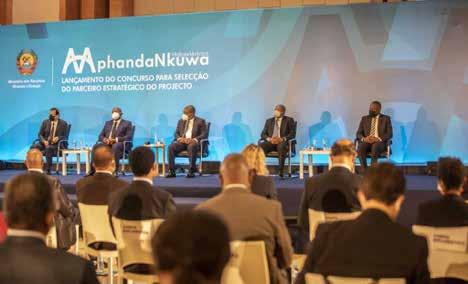
concession fee revenue. The project is fundamental for the energy transition and decarbonization of the southern region of Africa.
Carlos Yum has laid out the status of the Mphanda Nkuwa hydroelectric dam construction project. According to Yun, the project is budgeted at around US$5 billion, and work will start in 2024, the year in which nancing is expected to be de nitively concluded.
The project will take a total of six to seven years to complete. Of the approximately US$5 billion price tag, 60% is for the construction of the dam and 40% for the power transmission line. At this moment, the development o ce is preparing the launch of public tenders for the updating of the project's feasibility studies.
By December 2022, the o ce will launch a tender for the identi cation of the strategic investment partner, whose nancial closing a 2024 deadline has been set. In terms of shareholding, the Mphanda Nkuwa project will have the participation of the Mozambican state, through Electricidade de Moçambique (EDM) and Cahora Bassa Hydroelectric [(HCB), with between 30% and 35% of shares. The remaining 65% will be secured from private investors.
Carta de Moçambique also informed that there would be consultants involved – from Brazil,
the United States, Sweden and South Africa – to assess possible problems associated with the project according to the best international practices, avoiding pitfalls that have marred previous projects implemented in the province and in Mozambique generally.
It reported that experts and strategic investors, including the World Bank (WB) and the African Development Bank (ADB), have discussed some signi cant aspects concerning the implementation of the Mphanda Nkuwa hydroelectric project.
"Overall, we think this project is very important to the government's goal of universal access by 2030," said Zayra Romo, World Bank Mozambique Lead Energy Specialist and Infrastructure Practice Leader. As for the current stage of the project, which consists of the search for a strategic partner for the development of Mphanda Nkuwa, Romo said that the World Bank's support would consist of ensuring the greatest possible competitiveness for the project, with a view to selecting the best contractor or investors that have experience to e ectively manage Mphanda Nkuwa.
A press release from the Mphanda Nkuwa Implementation O ce said that these companies and consortia had replied to the tender launched in December 2021, and delivered their pre-quali cation documents before the deadline, rst xed on 28 February but, at the request of several of the bidders, it was
extended to 18 April. It is hoped that construction of the new dam (which has been on the drawing board for decades) will nally begin in 2024. Construction will last for at least seven years.
According to the media release by the Mphanda Nkuwa Hydroelectric Project Implementation O ce, the main objective is to ensure the coordination of actions for the implementation of the Mphanda Nkuwa project.
Location: The Mphanda Nkuwa Dam will be located in Tete Province, Centro region, on the Zambezi River, 61km downstream of the Cahora Bassa Hydroelectric Power Plant.
Project description: The Hydroelectric Power Plant will have a capacity of up to 1,500 Megawatts and an Electric Power Transmission Line from Tete to Maputo with 1,300 kilometres.
Budget: US$4.5 to US$5 billion, 60% for the construction of the dam and 40% for the power transmission line.
Strategic importance: The project will position Mozambique as an energy hub in southern Africa. It will provide lower cost energy in the country and region, contribute to universal access to energy in the country by 2030 and support rapid industrialization, with job creation, skills development and business opportunities (local content). Social and economic bene ts, in the form
Ghana’s Startup Ecosystem at a glance.
Ghana is becoming one of the most vibrant and developing startup havens on the continent. The country is nally catching up fast with countries such as Egypt, Kenya, Nigeria, and South Africa as some of the continent’s giants when it comes to startups.
Startups are often seen as businesses that are just starting out and have the potential to expand quickly. Due to variations in setup and vision, we can say that all startups are SMEs, but not all SMEs are startups.
These entrepreneurial endeavours are often founded by one to three entrepreneurs, who concentrate on creating a marketable product, service, or platform in response to a perceived market need.
Gleaning from continent-wide prospects, Africa is going digital as a result of a decade of economic
expansion, rapid urbanization, internet penetration, and the bankability of its population.
Technological innovation is advancing quickly. Ghana is no exception, as internet penetration has increased over the past ve years.
Ghana is leading the area in technical innovation, and the number and size of digital enterprises are increasing, heralding the arrival of the Fourth Industrial Revolution in the nation (particularly since the onset of the COVID-19 pandemic).
As a result, the number of startups has dramatically increased.
Given that the majority of Ghanaian businesses are informal SMEs that still don't use technology or digital solutions, the startup ecosystem's potential for innovation and growth in Ghana is still mostly untapped.
Talent is one of the key components of any start-up ecosystem, and
Ghana is developing a sizable talent pool of future digital leaders.
Ghana's development is a result of a number of positive factors, including substantial consumer and business markets, highly developed entrepreneurial skills, and a robust corporate sector.
To succeed, most startups require the ideal combination of networks, nancial markets, rules, and culture. Over the past ten years, Ghana has created an environment with a lovely interplay of these elements.
The Ghana Government in recent years has launched various initiatives aimed at developing a robust entrepreneurial and startup ecosystem. For example, to tackle the Ghana government introduced the "National Entrepreneurship and Innovation Plan" (NEIP) in June 2017 as a $10 million program to address the funding gap and lower youth unemployment.
The government's main method for
of royalties and income on concession fees for the Mozambican state.
Environmental approach: The project will be implemented in strict compliance with national standards and internationally accepted best practices for the development of projects of this nature, to mitigate negative impacts and maximize positive aspects. In this context, the Mphanda Nkuwa Hydroelectric Project Implementation O ce recently signed an agreement with the International Hydroelectricity Association for the assessment of the project's sustainability, including training and capacity building.
Mozambique News Agency reported, citing government sources, that there were eight international consortiums interested to become strategic partners of Mozambique in building the Mphanda Nkuwa dam, with electricity production: ETC Holdings Mauritius, Longyuan Power Overseas Investment (Chinese), PowerChina Resources, WeBuild Group, Scatec (Norway), Sumitomo Corporation, EDF and Kansai Electric Power (Japan).
With an approximate population of 30 million, Mozambique is endowed with rich and extensive natural resources but remains one of the poorest and most underdeveloped countries in the world. It is one of the 16 countries, with a collective responsibility to promote socio-economic, political and security cooperation within the Southern African Development Community.
aiding start-ups and small businesses is now NEIP.
NEIP has given over 7000 entrepreneurs across ten areas of the country specialized training in entrepreneurship and business development through tech hubs.
Again, it has provided 500 of those 7000 entrepreneurs with some initial money to support their most viable business concepts. Additionally, the government promises to give tax bene ts to NEIP participants based on how many workers they employ.
We are starting to witness momentum in the legislation space across Africa as more countries begin to nd the middle ground to launch Acts to regulate their startup ecosystem.

Startup Acts are extensive legislative and regulatory frameworks designed to promote entrepreneurship and make it possible for new businesses to develop with strong growth potential, typically by providing speci c incentives (tax, subsidies, procurement, etc.).
Tunisia, in 2018, paved the way as the rst country on the continent to pass the Startup Acts and this has been followed by Senegal in 2020. Other countries such as Rwanda, Mali, Nigeria, Ghana etc. have all activated conversation to be next in line.
Startups can function with the security provided by a de ned framework for expansion thanks to legislation. With the help of this legislative mechanism, innovative businesses with high growth potential are formed more quickly.
We cannot certainly talk about the startup ecosystem without touching base on the availability of strategic organizations such as entrepreneurship hubs, which have become the key and major driver of growth.
Startups and incubator hubs have become inevitable when it comes to startup ideation, execution, and growth.
Entrepreneurs and startups need a lot of capacity-building and support systems in order to succeed, and that is the critical role played by these entrepreneurship hubs, which are growing across various regions of the country.
While most of these hubs are technologically driven, there are equally some of these hubs that are speci c to certain niches, such as women's entrepreneurship, students’ entrepreneurship, as well as covering multiple sectors to sector agnostic hubs.
Annan Capital Partners is currently building a pipeline of critical support systems through their venture building platforms, including crowdfunding setups.
There are 1000 and 1 factors deemed critical to be considered before launching any business idea.
These are mostly universally and globally acceptable factors and are not necessarily applicable to a single country.
It’s fair to say that in venturing into Ghana’s startup space, these would be some of the few key factors to be met.
It is obvious that no company can grow if it doesn't have a brilliant idea. The growth of your company will be solely dependent on a brilliant and workable idea.
Additionally, you need to have a distinctive idea that stands out in the market because there are many competing businesses.
It can come o as naive. But if you're going to focus on making your business idea a reality for the next 12 months, enthusiasm is extremely essential.
If your business venture aligns with your passion, you'll succeed as an entrepreneur. Even if you start anything, if you don't believe in it, you mig
ht not be able to stick with it over the long term, regardless of how successful it may be.
It is one of the most crucial things that will enable you to overcome all obstacles and challenges.
You will encounter many dangers and di culties during this process, and your optimistic outlook will be the only thing that will keep you alive. To build your own business, you will have to put in a lot of e ort.
The funding of your business is the next crucial component that needs to be taken into account. You must accurately pinpoint the resources from which you will be able to obtain nance for your company.
Additionally, it is preferable to have a plan in place in order to properly manage a company's budget.
In our previous insights, we shared tips on Funding opportunities for startups in Ghana. That article will proof useful as well, as we will soon nd out that we cannot discuss the startup ecosystem without bridging the funding gap.
It’s important to develop strategies around the scalability of your idea and adequately defend it.
Scalability can be viewed as a company's capacity to expand when faced with a rise in demand for its goods or services and the ease with which its organizational structure and available resources can do so.
Scalability, then, is the ease with which your rm can grow without being restricted by your organizational structure.
The business plan
Without a business strategy (plan), no company can grow to its full potential. You can get guidance and nd out if your idea is workable by creating a business plan. You will be able to determine every necessary next step with the aid of a company strategy.
For instance, a crucial component of creating a business plan that many entrepreneurs skip over is competitive study, allowing you to be on guard against new entrants and how to overcome such competitors e ectively.
The completion of legal paperwork is a crucial component that must be taken into account. The rst stage will be to register your business, and the documentation of this is referred to as business formation documents.
It’s a mandatory requirement to get your business registered in Ghana, (Registrar Generals’ Department/Registrar of Companies).

This de nes how simple it will be for you to set up, but it also indicates how erce the competition will be. A low entry barrier industry is frequently overrun with shoddy start-ups. It can be quite challenging to distinguish out in a niche like this.
This will easily become known to you during the preparation of the business plan.
Opportunities for startup ideas in Ghana abound across all sectors. It’s almost certain that every sector of the Ghanaian economy has room for
more business ideas and opportunities.
Technology is changing how entrepreneurs can create these opportunities in traditional and new sectors of the Ghanaian economy.
Annan Capital Partners is leading in building a venture support systems for Ghanaian startups, after initiating the yet to be launched Agoo Africa crowdfunding platform.
“Agoo Africa is a crowdfunding platform for African early-stage start-ups’ and small traditional businesses.”
“When launched, it will allow owners of such businesses to make their project and their pitch accessible to a large number of investors, from young non-professional business angels to established international funds.”
Paul Frimpong, CGIA, ICCE
Paul Frimpong is a development economist, top voice on Sino-Africa relations, and an award-winning entrepreneur.

He’s currently the Global Head of Strategy & Membership at the Institute of Certi ed Chartered Economists (ICCE).
This article is originally curated for and published by: Annan Capital Partners.
Annan Capital Partners (ACP) is a boutique investment advisory and business development agency o ering holistic wealth management and venture building services to a wide range of clients, from entrepreneurs to governments and from local SMEs to global corporations.
https://annancapitalpartners.com/ py.frimpong90@gmail.com

knowledge and remain relevant”, she emphasized.
She further admonished women not to wait around, rather be more proactive and assertive. “It is a well-known fact that women underestimate themselves all the time. On the other hand, men grab opportunities even if they feel they are not ready and this makes a huge di erence”, she added.
The successful event, which attracted hundreds of young women from across the nation’s capital and beyond, provided a platform for women to share their real life experiences and discuss solutions to challenges women are confronted with.

+),%!(-&%!./%001/%!/%012%0!-3! 1$2%%#$2)3.)45$67'8%)72.,$'9):'.;%),3)$'6%2)6.,2$2%,)$',2%)73., 96.=2$6.=)6.59',63.'$()%,$'6.%>)?62$$')@23.2):27'<2),"2)56$%,)4 $',2%),"6%)(2'$A)965,6.=)6,%):2.7"<'$;)*+B):'%6%)C36.,%),3)*D>+ @23.2)93%,)GDE)35)6,%)H'9#2)'='6.%,),"2)&399'$)6.)+/++A)'.&)6%)
*IA/I/>)4..#'9)6.59',63.)%3'$2&),3)J0>G+E)6.)K3H2<:2$>)L9%2F"2$ 6.59',63.)6%)2H2.)<3$2)$'<C'.,>)N"'.'8%)6.59',63.)"6,)')$273$&) "6="2%,)6.),"2)F3$9&A)9'%,)<3.,">)O.59',63.)"'%):22.)':3H2),"2)72.,$'9): 72696.=)35)*/E)%6.72)?2C,2<:2$)+/+*A)5#296.=)')7#$$2.7()'.&)&2: ,"2)P'.;)35)N"'.'),3)$'6%2)6.,2$2%,)$',2%),3)+QE)9'%,)(2'$>)R25 '='6.%,)&2C$276
Ms. Eunice Golloh, the President and Founder of Impact Wave Initiative, a women community driven non-pro t organization, has charged women to continue upgrading themselves in order to equip themselves to challenge the status quo and make a meaningful contribution to national development.
She made the call when her organization hosted its maiden “Impact Conference 2022” on Thursday 22nd December 2022 at the Holiday Hotel in Accra. It was a deep conservation about women empowering one another, looking out for each other and building synergies amongst themselves for growth.
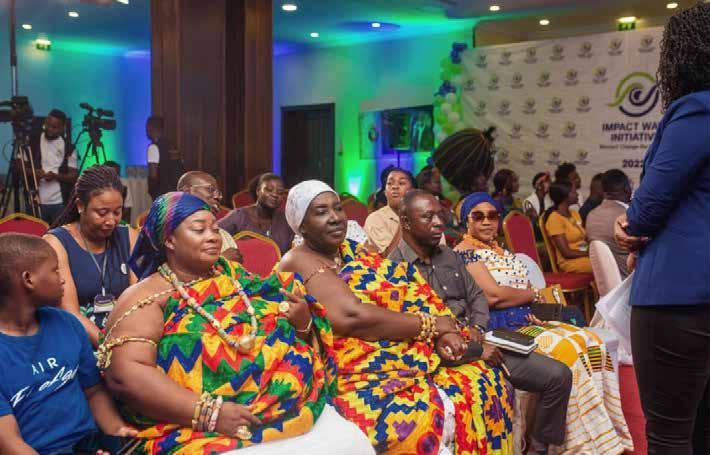
In her welcome address, she said, “knowledge is an important currency today and there are several ways of acquiring knowledge now. With convenient online options to enhance skills and earn new certi cations, it is important for women to make sure that they remain ahead of the curve. This is one of the ways to ensure that people come to you for your expert
The distinguished panellists and speakers at the event included Ms. Ablah Dzifa Gomashie, former Deputy Minister of Tourism of the Republic of Ghana, Ms. Abigail Nikoi, a Business Development Professional and Marketer, Ms. Pearl Laryea, a Pastor and Entrepreneur and Ms. Cordelia Ama Selormey, a Media & Communications Consultant. Ms. Selina Bentoom, the Executive Director for African Foundation for Premature Babies & Neonatal Care (AFPNC), excellently moderated the event.
+),%!(-&%!./%001/%!/%012%0!-3! 1$2%%#$2)3.)45$67'8%)72.,$'9):'.;%),3)$'6%2)6.,2$2%,)$',2%)73., 96.=2$6.=)6.59',63.'$()%,$'6.%>)?62$$')@23.2):27'<2),"2)56$%,)4 $',2%),"6%)(2'$A)965,6.=)6,%):2.7"<'$;)*+B):'%6%)C36.,%),3)*D>+ @23.2)93%,)GDE)35)6,%)H'9#2)'='6.%,),"2)&399'$)6.)+/++A)'.&)6%) *IA/I/>)4..#'9)6.59',63.)%3'$2&),3)J0>G+E)6.)K3H2<:2$>)L9%2F"2$ 6.59',63.)6%)2H2.)<3$2)$'<C'.,>)N"'.'8%)6.59',63.)"6,)')$273$&) "6="2%,)6.),"2)F3$9&A)9'%,)<3.,">)O.59',63.)"'%):22.)':3H2),"2)72.,$'9): 72696.=)35)*/E)%6.72)?2C,2<:2$)+/+*A)5#296.=)')7#$$2.7()'.&)&2: ,"2)P'.;)35)N"'.'),3)$'6%2)6.,2$2%,)$',2%),3)+QE)9'%,)(2'$>)R25 '='6.%,)&2C$276',63.)'&&%),3)C$2%%#$2)53$)5#$,"2$)$',2)"6;2%)6.),"2)(2'$)'"2'&
Impact Wave Initiative is dedicated to assisting young women build themselves to their best potential through mentorship, workshops, and physical development. Its vision is to change the concept and mindset of today’s women to change the narrative.
7)-/)!8%)&%/!)0!$9/:*!;)3&!.)/%0!7-<%/-)!=>?!91,:99& !"2)K'6$')F2';2.2&)'='6.%,),"2)&399'$A),$'&6.=)',)QB+)5$3<)QJD) 53993F6.=)')=$'&#'9)C67;)#C)6.)ST)&2<'.&>)!"2)M3$ 273.3<(),3)=$3F)',)')%93F2$)$',2),"'.)C$2H63#%9()53$27'%,A)C$2& 2UC'.%63.),"6%)(2'$)73<C'$2&),3)'.)2'$962$)2%,6<',2)35)0>*E>)!" 73.,6.#2&)F2';.2%%)6.),"2)73#.,$(8%)369)%27,3$A)F"67")"'%):22. ',,'7;%)'.&),"25,A)92'&6.=),3)C$3,63.)%"#,&3F.%)'.&)7#$,'696 ,';2)'&H'.,'=2)35)9'%,)(2'$8%)292H',2&)369)C$672%>)M6,")7$#&2)C
Huawei Ghana has donated two set of ultramodern intelligent video conferencing equipment to support the activities of the Ministry of Foreign A airs and Regional Integration.

The donation which took place at the Ministry of Foreign A airs and Regional Integration on Wednesday, December 21, 2022 comes as part of e orts to boost the ICT capacity of the Ministry and help facilitate e ective remote communication between the Ministry, its stakeholders and international organizations.
Speaking during the brief donation ceremony, the Director of Government and Public A airs at Huawei Ghana, Mrs. Jenny Zhou, thanked the Minister for continuously supporting the operations of Huawei in Ghana.
According to her, the donation of the two Huawei Idea Hubs (intelli-
gent video conferencing equipment) is to help the Ministry and its stakeholders carry out its missions e ciently across the globe under both normal and crisis situations.
The Minister of Foreign A airs and Regional Integration, Hon. Shirley Ayorkor Botchwey, thanked Huawei for their support and generosity indicating that the equipment which has come in a timely manner will be put to good use as it will aid with virtual meetings and make communication more convenient.
She also thanked Huawei for supporting the digital transformation agenda of the Government of Ghana since its establishment in the country.
“Huawei is very entrenched in Ghana and we are happy you are here. Following Covid-19, it has now become the norm for many meetings to be held virtually. This is to say that this state-of-the-art equip-
help us greatly especially for our virtual meetings and for e ective interaction with our missions abroad. “The equipment will be put to good use and handled well as this will take us a long way in ensuring that we represent Ghana and the Ministry well. I would like to say that we are very grateful to Huawei, for the
%27#$6,()6%%#2%)C2$%6%,6.=A),"2)73#.,$(8%)369)C$3,63.)3#,933 M2)2UC27,)ST)&2<'.&),3)5#$,"2$)F2';2.),"2)K'6$')6.),"2).2'$),2$
73.,6.#2&)F2';.2%%)6.),"2)73#.,$(8%)369)%27,3$A)F"67")"'%):22. ',,'7;%)'.&),"25,A)92'&6.=),3)C$3,63.)%"#,&3F.%)'.&)7#$,'696 ,';2)'&H'.,'=2)35)9'%,)(2'$8%)292H',2&)369)C$672%>)M6,")7$#&2)C %27#$6,()6%%#2%)C2$%6%,6.=A),"2)73#.,$(8%)369)C$3,63.)3#,933 M2)2UC27,)ST)&2<'.&),3)5#$,"2$)F2';2.),"2)K'6$')6.),"2).2'$),2$
Mrs. Jenny Zhou thanked the Minister for her warm reception and indicated that Huawei as a responsible corporate citizen stay committed to working closely with the Ghanaian government, to promote the development of its ICT infrastructure and help improve the lives of citizens.
F3*!,9!FE9:)!%.-*%2-@!0.1/0!K<)3*)!J(-::-3<!<)-30 !"2)?"6996.=)%,$2.=,"2.2&)'='6.%,),"2)&399'$A),$'&6.=)',)0GDB)5$3<)0Q*0)',)9'%,)F22;8%) 793%2A)'%)a='.&')'.&),"2)M3$9&)b2'9,")c$='.6d',63.)&279'$2&)'.)2.&),3),"2) 73#.,$(8%)L:39')2C6&2<67)'5,2$)'9<3%,)53#$)<3.,"%>)K3).2F)6.527,63.%)"'H2):22.) &2,27,2&)53$)<3$2),"'.)J+)&'(% &3#:92),"2)6.7#:',63.)C2$63&)53$),"2)H6$#%>) a='.&'8%)F3$%,)L:39')3#,:$2';)6.)<3$2),"'.),F3)&27'&2%)$2%#9,2&)6.)*J0)7'%2%)'.&) BB)&2',"%>)M2)2UC27,)5#$,"2$)='6.%)53$),"2)?"6996.=)6.),"2).2'$),2$<>
three pharmaceuticals GSK, Johnson & Johnson AstraZeneca report shows that more pharmaceuticals are moving to access to medicines Access to Medicine ranked the top 20 pharmaceutical companies globJohnson & Johnson and AstraZeneca took the top three in the list.
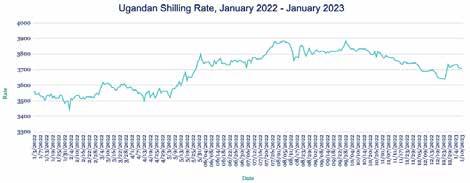
AstraZeneca’s top three position 2022 Access to Medicine (AtMI) re ects the compaleading work to strengthen health systems, as well as equitable and a ordable access to life-changing
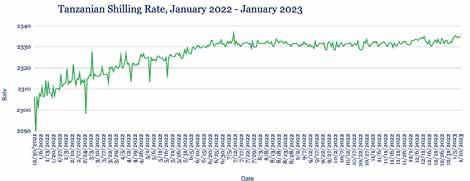
treatments.
Pascal Soriot, Chief Executive O cer, AstraZeneca, said: "We believe it’s vital everyone has access to a ordable, sustainable, and innovative healthcare, particularly in low- and middle-income countries. This ranking re ects AstraZeneca’s strategic focus on improving access to medicines and to the crucial work with our partners to strengthen health system resilience.”
dle-income countries (LMICs). It focuses on three technical areas: Governance of Access; Research and Development (R&D); and Product Delivery. AstraZeneca moved up from 7th to 3rd position after performing well across all three technical areas.
fers, was also highlighted as key to ensuring continuous supply of medicines in LMICs. Furthermore, the AtMI recognised AstraZeneca’s local capacity building initiatives and use of inclusive business models aimed at meeting the access needs of populations at the base of the income pyramid.
L)3M)3-)3!J(-::-3<!0,)E:%!13*%/!3%8!@%3,/):!E)3&!:%)*%/0(-. !"2)?"6996.=)F'%)%,2'&()'='6.%,),"2)&399'$A),$'&6.=)',)+00B 6.)96.2)F6,")9'%,)F22;8%) 793%2)'.&)"'9,6.=)')%"3$, 96H2&)F2';2.6.=),$2.&>)!"2)=3H2$.<2.,)"'%)'CC36.,2&) 53$<2$)56.'.72)<6.6%,$()355676'9)L<<'.#29)!#,#:')'%),"2)73#.,$(8% .2F)72.,$'9):'.;) =3H2$.3$A)$2C9'76.=)S93$2.%)@#3=')',),"2)2.&)35)"6%),2$<>)!'.d'.6'8%)6.59',63.)$',2) 2'%2&)%96=",9()6.)R272<:2$A)5'996.=),3)J>DE)5$3<)J>IE)6.)K3H2<:2$)'<6&)%93F6.=) 273.3<67)'7,6H6,(>)!"6$&)Z#'$,2$)NR1)=$3F,")%96CC2&),3)B>+E)5$3<)B>BE)53$),"2)%'<2) C2$63&)')(2'$)2'$962$>)V$3C)C$3,63.)=$3F,")5299),3)+>QE)5$3<)G>DE)')(2'$)2'$962$A) '9,"3#=")$2H2.#2)F'%)%#CC3$,2&):()533&)C$672)6.7$2'%2%)'<6&)2UC3$,)&2<'.&)5$3<) .26=":3#$6.=)73#.,$62%>)M2)2UC27,),"2)?"6996.=),3)$2<'6.)%,':92)',)'$3#.&),"2)+00B) 92H29)6.),"2)F22;)'"2'&)'%),"2)73#.,$()%22;%),3)73.,$39)6.59',63.'$()C$2%%#$2%):() 2'%6.=)6.,2$.',63.'9),$'&2):'$$62$%>

AtMI is an independent ranking of 20 of the world’s largest pharmaceutical companies and evaluates their impact on improving access to medicine in low- and mid-
AstraZeneca was recognised by AtMI as the industry leader in Product Delivery, noting its application of tailored access strategies for di erent countries re ecting their income classi cations across all product categories. The Company’s approach to patent transparency and sharing of intellectual property assets, using technology trans-
AstraZeneca also performed well in the Governance of Access category re ecting robust compliance controls, and also in R&D for its access plans for projects in Phase 2 or 3 of clinical development. Ongoing company initiatives to support access to COVID-19 vaccines via manufacturing, procurement, and distribution agreements in the light of the pandemic were also recognised.
fJJ)+/)0JQD)IQ*/
Read more about the delivery of AstraZeneca’s Access to healthcare commitments in the 2021 Sustainability Report and Sustainability Data Summary.


Sika Mpε Dede, the maxim by the President has quickly metamorphosed into many things. From t-shirts to music and now, a book. The masterpiece authored by Certi ed Financial Fitness Coach; Peter Kwadwo Asare Nyarko & Certi ed Professional Trainer (CPT); Samuel Agyeman-Prempeh is an eye-opener on many salient money conversations.
Launched at the WestLionCo premises on the 25th of November 2022, it was well attended by patrons who thronged the place. Preceding the book launch was the Start-up Dialogue which saw experts in their various elds such as Ethel Anne Komlaga of Enterprise Bureau, Peter Kwadwo Asare of Center for Financial Literacy Education (CFLE Africa), Paul Frimpong of WestLionCo and Samuel Agyeman-Prempeh of Role Model Africa headlining the
event.
Ethel Anne Komlaga who spoke on Entrepreneurship and Funding expounded the need for entrepreneurship in these uncertain economic crises. She explained the need for each entrepreneur to discover their makeup and use that to their advantage. She gave wonderful insights on how to position oneself for funding. In her words, “there is a lot of money for funding”. All one needs to do is to identify the many sources of funds available.
Peter Kwadwo Asare Nyarko, Executive Director for the Center for Financial Literacy Education (CFLE Africa) and co-author of Sika Mpε Dede engaged participants with priceless nuggets on nancial planning. He broke down the complexities of money and the need for everyone to be nancially independent. He said, “everyone
must know the 5Ms of money. The Meaning of money, The Making of money, How to Manage it, How to Multiply and Move it”. He believes these pillars shape one’s nancial trajectory.
Paul Frimpong of WestLionCo spoke on investments. Explaining the intricate details of investments especially in these times, he gave a detailed breakdown of the everyday nancial jargons hurled at us by the experts. He explained that, “risk is closely tied to investment”. He asked all potential investors to read more before making any investment decisions.
The climax of the session enchanted participants with a delivery by co-author of the masterpiece, Samuel Agyeman-Prempeh sharing his perspective on the all-important subject of juggling between a day job and a side hustle. Broaching the topic which has become a favorite of many, both in the formal and informal sector, the IAPPD Certied Professional Trainer (CPT) engaged participants on the need for side hustles to become much more than something we do for survival. “We need to run our
businesses so well that they function with e ective systems and process, he highlighted. Mr. Agyeman-Prempeh emphasized the need for entrepreneurs to disintegrate themselves understand all aspects of the business but very importantly trust and work with team mates and partners as that serves as a catalyst for the growth of the business. The event rounded up with the launch of what is potentially a bestseller ‘Sika Mpε Dede’. The book speaks on the many silent topics regarding money and its usage in our society and the world at large. A great companion to the student confused about money to the trader who seeks to make the most of his money to the investor who is in a dilemma on what to do in these times.
Peter Kwadwo Asare Nyarko and Samuel Agyeman-Prempeh’s ‘Sika Mpε Dede’ is a light for all in these challenging nancial times.
Published by Lumière Creatif, the book is available on Amazon, Sayda, Booknook and Selar.
!2++2#"*/&+$0.(*
IE4*6@!7M-M*4G!7+*!:*M;4!+?>$!*47?E4;!Q*+;M:-G!5E;!
E5-M*5>!65G!Q>MWW4-4;!?E!-.4!E4,!@45*!5G!-*5;4*G!
*4:+EG?;4*4;!E45* -4*W!,+**?4G!+34*!:+>;!
,45-.4*!5E;!745*G!+7!GMQQ>@!G.+*-564G!5E;!

;MWQ4;!:+E-*5:-G =*4E-!7M-M*4G!-*5;4;!55!F5**4>$!:+WQ5*4;!-+!bPcL8/0X 5-!,44C!


?E6 ,a, 5E;

G:5>4;!MQ!-+ E45*!G434E W+E-.!.?6.G$! 5G!W+;4*5-?E6!b/P/!9+FG!6*+,-.!G?6E5>4;!W+*4!
G>+,?E6!+7!*5-4!.?C4G!F@!-.4!\4;4*5>!A4G4*34 '+>;
bPcX$LR0/<&$ 7*+W bPcX$L#8/L& >5G-! *47>4:-?E6!,a, 65?E 5E; [J( 5QQ*4:?5-?+EG %/#L1!*4GQ4:-?34>@ J.4!Q*?:4!+7!Y+:+5! *4:+*;4; 5E!?E:*45G4 7+* -.4! .4!:+WW+;?-@ -*5;4; 5- bPc%$R&8/&&! Q4*! +E!\*?;5@$

;475M>-!+*!5*4!3M>E4*5F>4!-+!+-.4*!5;34*G4!:*4;?-! 434E-G/!J.4G4!F+E;G!5*4!5--*5:-?34!-+!?E34G-+*G! F4:5MG4!;4GQ?-4!-.4!*?GC!-.4@!-@Q?:5>>@!Q5@!WM:.! .?6.4*!@?4>;G!-.5E!F4--4*!gM5>?-@!F+E;G/

Huawei has earned a top rank from CDP for its actions on climate change and transparency of disclosures. The international environmental non-pro t organisation placed the company among its Climate change “A List”, the only rm from mainland China to get the accolade. CDP also granted Huawei an “Excellent Environmental Leadership Award”.
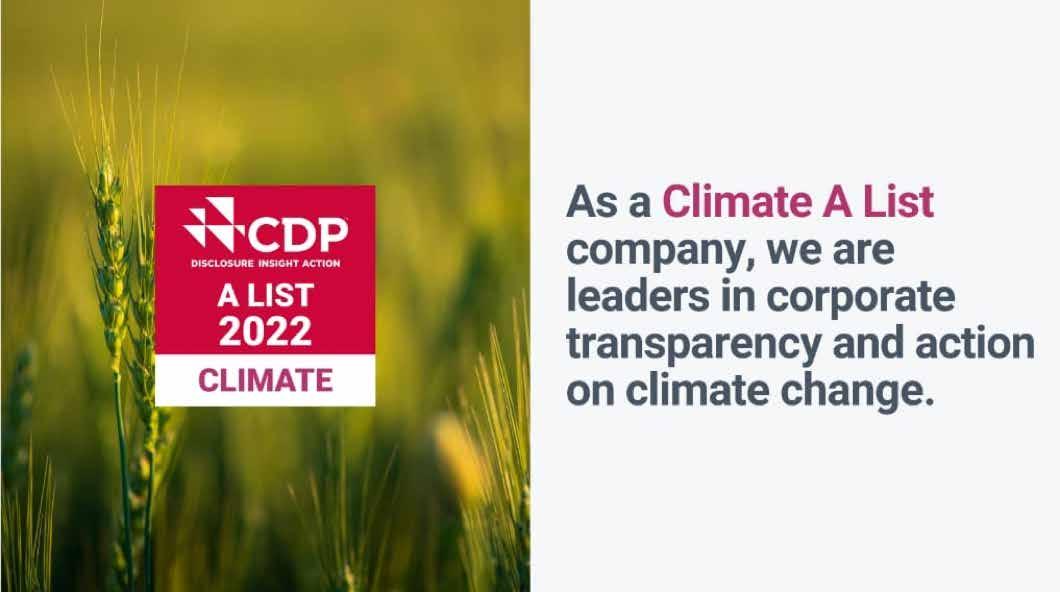
Huawei included in the 2022 CDP Climate Change “A list”
Huawei adheres to the concept of "Tech for a Better Planet", meaning to use technology to foster green development and combat climate change. ICT technologies, Huawei believes, are powerful tools for reducing carbon emissions, promoting renewable energy, contributing to a circular economy, and protecting nature.
In its own operations, Huawei
strives to promote energy conservation and emission reduction, as well as to use more renewable energy.
Meanwhile, our Digital Power business focuses on areas such as –clean power generation, electri cation of transport, and green ICT infrastructure – to facilitate global energy transition.
By the end of 2022, Huawei has helped its customers generate over 695.1 billion kWh of green power, and reduce customers’ power consumption by 19.5 billion kWh, equivalent to avoiding nearly 340 million tons of CO2 emissions.
In addition, Huawei incorporates the concept of circular economy into its product life cycle management, from product design to end of service life. We are committed to using more eco-friendly materials and greener packaging, lowering carbon emissions in our processes,
and producing more durable products that reduce waste.
To complement our own e orts, we work with partners such as environmental protection organizations and scienti c research institutions, to harness technology in innovative ways to protect forests, wetlands, oceans, and nature as a whole.
Tao Jingwen, Director of the Board and Director of the Corporate Sustainable Development Committee for Huawei, said: "Sustainable development is an important part of Huawei's overall strategy. To address the global challenge of climate change, we believe that technology is a key enabler of sustainable development, to create a more inclusive and environmentally-friendly world. Huawei hopes to work with global customers, suppliers, and partners to promote green
and sustainable development in various industries and build a low-carbon society."
Dexter Galvin, Global Director of Corporations and Supply Chains at CDP, congratulated Huawei for its performance. He said: “Environmental transparency is the rst vital step towards a net-zero and nature-positive future. In a year of ever-increasing environmental concerns around the world – from extreme weather to unprecedented losses to nature – the need for transformational, urgent and collaborative change is more critical than ever.”
Galvin continued: “As CDP continues to raise the bar on what quali es as climate, forests and water leadership, we hope to see the ambitions and actions of companies on the A List – and those wanting a place on it – do the same.”